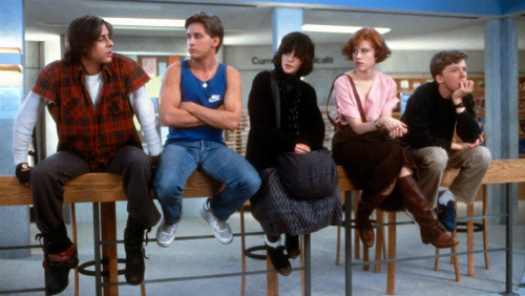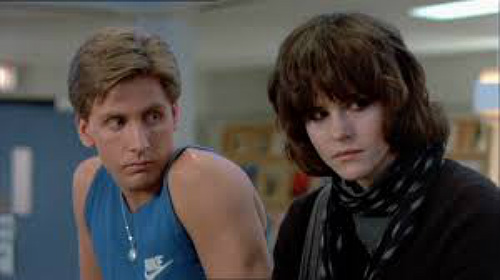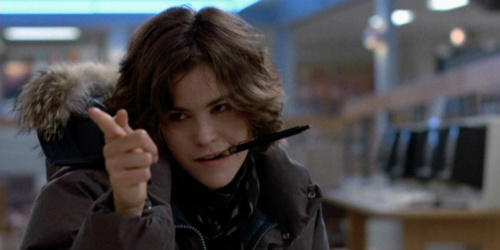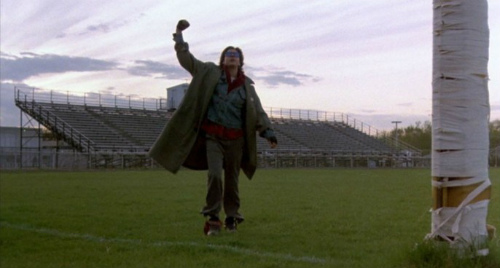Me.
Mistletoe.
RETRORATING: 11
OFFICIAL
- HOME
- YOUTUBE
- ARTICLES
- VIDEOS
- THEATER
- CLASSIFIEDS
- VHS COVERS
- CEREAL BOXES
- GAME BOX ART
- READ ALONGS
- PODCASTS
- FORUM
- FAQ
- POINTS STORE
Don't mess
with the bull.
JOIN!!!
The Breakfast Club and Changing Perceptions

While the latter can be debated and has been debated as something of an antithesis to the idea of individuality, I think “The Breakfast Club” is often unfairly misinterpreted. Sure by the final half of the movie, Allison Reynolds changes herself, but not because she's seeking the approval of Andrew Clark. “The Breakfast Club” is about perceptions of ourselves and others and how we're often pigeonholed at young ages. The characters we meet in “The Breakfast Club” have been handed roles that they don't want, and are likely going to be stuck in their roles forever.

When we meet him, for reasons that's not quite clarified, he takes a liking to the people he's assigned to endure detention with. He spends the afternoon trying to convince at least one of them that he's not the man many have categorized him as. Ironically he finds kindred spirits in the four students he's among, all of whom are basically just people sitting in a rut without any hope of escaping. Andrew Clark is a meat headed jock, and likely has to play sports to get in to college, while Brian is an overachiever who puts too much pressure on himself because he simply can't fail.

By the end, Sheedy is struggling to convince everyone she's not this freak they see her as. So she makes, what I assume is a temporary break from her pigeon holing, showing that she's so much more, and she pulls it off. I never saw it as her shedding the image she flaunted so proud, but lifting the veil to show she has so much more dimension to her than what everyone sees. The entirety of Hughes' teen drama is about a group of teens that have been pegged as one role. One is the jock, one is the brain, one is the prom queen. They even admit it in the final scene when Vernon is reading the letter that Brian has left behind.
It will always be a disadvantage to them, definitely, but it can also be something they can use perhaps to benefit themselves and others. The movie ends famously on Bender pumping his fist in the air. But it's not because he won Claire, it's because he convinced her and everyone else that he's a person of depth, and pain, and might actually have something to look forward to beyond a miserable abusive life. When he goes to school on Monday he probably won't talk to Claire at all, but he's convinced her he's not a bad guy, so he can probably change someone else's mind.


Superman Posted on Jul 10, 2017 at 08:32 PM
This is an interesting assessment of a great movie. Thanks for sharing your thoughts.
Vaporman87 Posted on Jun 09, 2017 at 12:21 PM
As many times as I've watched this movie, I've never actually viewed Allison's "makeover" in the way you describe. I've never had that "debate".
To me, she is just opening herself up to Claire... allowing Claire to share this ritual with her. A bonding moment. It's just that there was the added benefit of Andrew seeing how beautiful she actually is when she is not hiding under a coat and mop of hair. I don't think she changed at all.
Hoju Koolander Posted on Jun 09, 2017 at 02:11 AM
Fun movie with some great monologues that do make high schoolers stop and think about those roles that are forced on them by others. A bunch of my friends actually performed a scene from The Breakfast Club for a high school talent show, which has always given the film a special place in my heart.
OldSchool80s Posted on Jun 08, 2017 at 08:50 PM
Love, love, love The Breakfast Club. I enjoyed reading your perspective and agree with the majority. Thanks for sharing!
Lazlo Posted on Jun 08, 2017 at 11:00 AM
I am a great fan of "The Breakfast Club" and John Hughes, and feel so blessed to have had both as part of my teen years. I think you have some insightful comments about BK. It was indeed about five teens, who could have been teens from almost any American high school, breaking through the stereotypes and discovering each other as real individuals. Its a protest against the clique system. And its full of these revealing moments: when Bender talks about his apparently abusive parents, when the Andrew (the jock) reveals a cruel prank he played on another student and draws a response from Brian (the nerd), when Allison (however awkardly) gradually reveals more of herself as the movie progresses. Really, the film is a breakthrough movie, and deserves a lot more credit that it sometimes gets.
So Christmas is over, (almost?) everyone is happy with what they got, and it's already that time to put the decorations and lights away. But, where an...
In the middle of the 16-bit video game console era, many developers tried to go with the trend of making their own video game mascots for their compan...
With the month of November coming to a close, there was always the day of the family gathering to look forward to, being around relatives you probably...
Being diagnosed with aspergers at the age of two, I never had the thought of how different I was from the other kids I befriended during my childhood....
Throughout the decade of my childhood, I had toys that came and went but many which shaped my youth, whether it was the simple building of LEGO or the...







